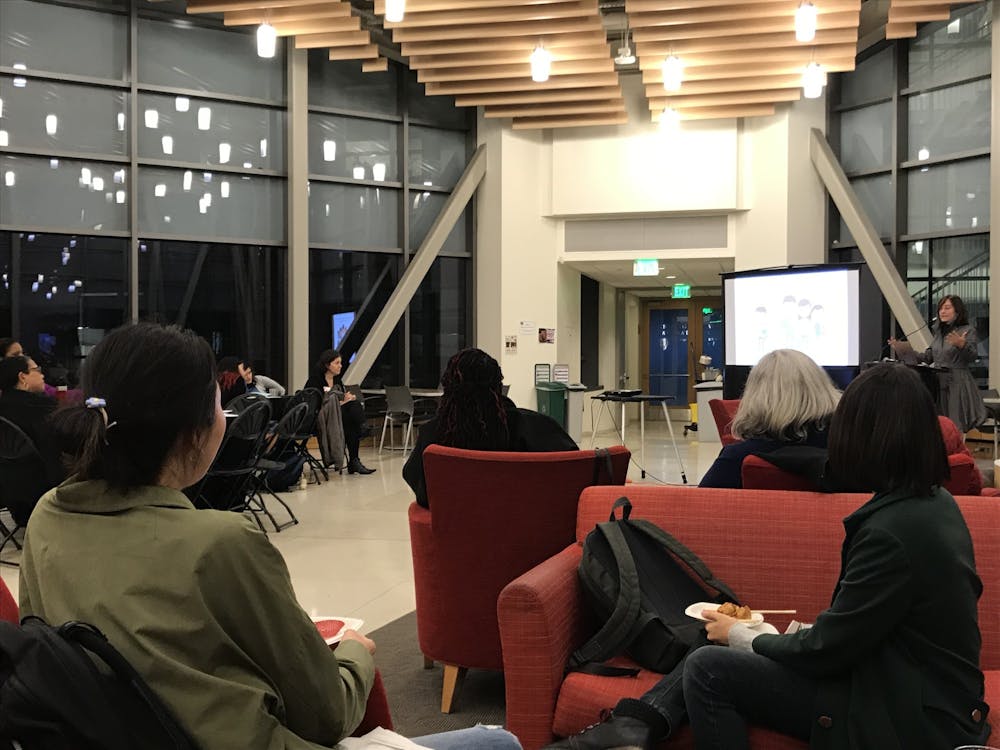The Women Faculty Forum (WFF) at Homewood held Where We Stand, an event which included a series of presentations and small group discussions that explored the topics of gender equity and community, on Monday.
WFF seeks to expand leadership opportunities for women, advocate for equitable policies for all faculty, and continue to address gender equity issues and challenges to the full participation of women faculty at Hopkins.
Anne-Elizabeth Brodsky, a senior lecturer in the Expository Writing Program and the co-chair of WFF, opened the presentation by acknowledging that members of society are often exposed to gender stereotypes. She provided insight into how early gender biases can be taught to children by providing an example of kids being asked to identify which of two images depicted the “smarter” person.
“At age five, kids tend to choose the one who looks like them. At age six, they choose the white man,” Brodsky said.
Karen Fleming, a professor in the Biophysics Department and the other co-chair of WFF, spoke about the need for community and inclusion in order to achieve excellence in a diverse community like Hopkins.
She listed two requirements to achieve inclusion: culture and climate.
“Culture is what we say we value. Climate is what the community members feel is valued. Notice the slight, subtle difference between these two things. But in order to achieve inclusion, it must be the case that culture and climate are in harmony with each other,” Fleming said.
Fleming shifted her talk to women in the STEM field and why there are few women in the field. She described the situation using a metaphor of a leaky STEM pipeline, where women and minorities drop out of STEM at every step along the way in their training like water out of a leaky pipe.
“For a long time we blamed this problem of lack of equitable representation in the academy on the fact that women opt out. The main reason has been that the child-bearing years are overlapped with the years of most intense training,“ Fleming said. “[But] if you go home tonight and your kitchen sink has been leaking, do you yell at the water? No, you don’t blame the water. Instead, you call a plumber, and you fix the pipe. What we need to do as a community is to fix the pipe.”
Beverly Wendland, dean of the Krieger School of Arts and Sciences, based her talk around a book that she read, Caroline Criado Perez’s Invisible Women: Data Bias in a World Designed for Men.
“It’s about the data gender gap, that there are so many things in the world that basically ignore the fact that half of the population is women,” Wendland said.
Former Maryland State Senator Barbara Mikulski, who is currently a professor of public policy at the University, spoke about her experience working in the Senate. In the early days of her career, Mikulski recalled the few women in the Senate reaching across the political aisle to get to know each other under the commonality of being female.
“We got to know each other as people. In the course of that getting to know each other, we could find common ground,” she said.
Mikulski suggested that she would like to see relationships being formed amongst the female faculty at Hopkins.
“For every new woman faculty member, we ought to do a welcome wagon. It’s not easy to get to know Hopkins. We need a welcome wagon to help [them] get started in [their] department, with other people, within the institution,” she said.
WFF also organized round-table discussions in small groups with the guests at the event. Some students were interested to hear about what went on in departments outside of their own.
This was the case for Alexandra Lossada, a fourth-year PhD student in the English Department who was invited to be a round-table discussant for the event.
Lossada spoke about the differences in the environment for women in the humanities and STEM departments.
“Perhaps the biggest difference between a humanities-based department and a STEM department is the fact that those graduate students have to go to lab, whereas students in the humanities don’t have labs. So in some sense, it seems to me that the power dynamics between the advisor PI and the graduate student in STEM departments is a lot more pronounced than they are in the humanities departments,” she said.
Tara Ghazi, a third-year PhD student in the Psychological and Brain Sciences Department, appreciated the wealth of information that was provided to her through the speakers and the articles present on the tables for the guests to keep.
“The speakers definitely had some very interesting points to raise. But I also appreciated this model of having a lot of very valuable information at the table in paper form because there’s clearly many angles to this kind of subject; it’s really complex and large. And so it’s nice to have such information here as talking points to understand and take in,” she said.
Emma Dallon, a second-year PhD student in the Biology Department, suggested that Hopkins can work towards improving the environment for women on campus by getting the word out, which can be done through events like Where We Stand.
“It’s best to start with awareness, just so that you can have conversations like we’ve had here to see what needs to be changed,” Dallon said.





